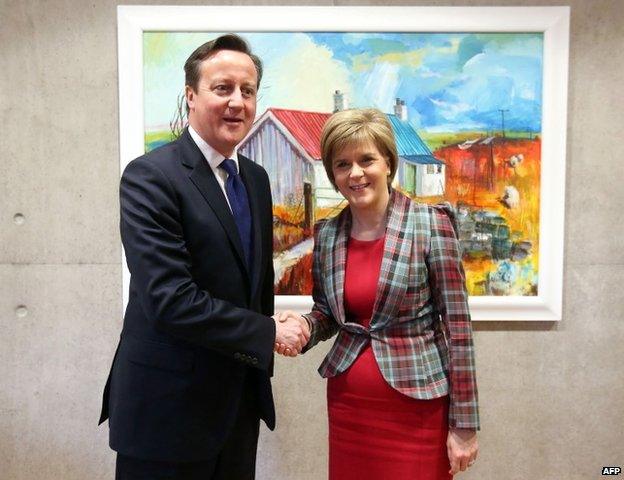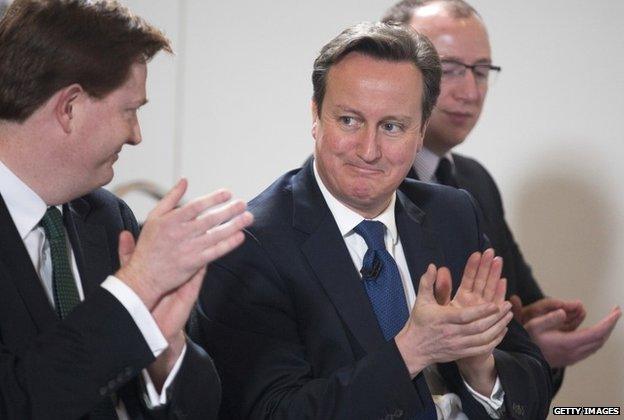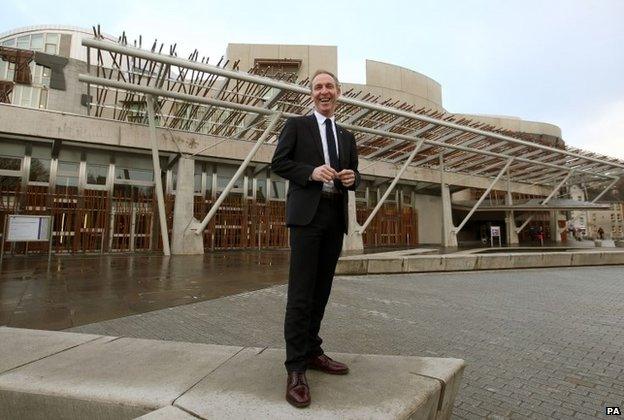Party leaders jostle for attention
- Published

David Cameron and Nicola Sturgeon met in Edinburgh, but there is still disagreement over the issue of more powers
The chancellor has forecast "tax competition" as a consequence of the new powers being devolved to Scotland.
Today we had competition of a different kind as sundry political leaders jostled for attention.
Pity poor David Mundell, the Conservative Minister at the Scotland Office. It fell to him to expound the draft laws arising from the Smith Commission to the House of Commons.
Normally, delivering the Commons statement is the big gig. These are not normal times. Scottish politics is not in a normal condition.
Even as Mr Mundell rose to his feet, he was being studiously upstaged by his immediate boss, the Liberal Democrat Scottish Secretary Alistair Carmichael - who launched the plans in Edinburgh, attracting considerably more attention.
Move forward a couple of hours and the focus shifts again.
Serious problems
The prime minister is in Scotland's capital, for a courtesy call on the presiding officer, talks with the first minister - and a chance to launch the document once more. (So good they launched it thrice.)
Meanwhile Nicola Sturgeon was answering questions on the topic at Holyrood - fine, she said, as far as it went but with serious problems over the transfer of benefits.
For Labour, Jim Murphy's contribution was to argue for the devolution of powers from Holyrood to local communities.
Patrick Harvie of the Greens pitched in, warning that environmental powers, such as over fracking, might be pre-empted by Westminster action in the meantime.
Why does all this matter? Because these are indeed different times - and this is a rather unusual command paper with its concomitant draft legislation, external.

The PM headed to Scotland with his Lib Dem colleague Danny Alexander
Usually, a government publishes its plans - with an intention to legislate.
Today's scheme is different.
It would fall to be implemented by a government, yes, following the UK General Election in May.
But a government of which colour? By a single party or a coalition or another form of agreement? Who would wield influence over delivery?
So each party places a different interpretation, a different emphasis upon aspects of the document and draft clauses. It is a single transferable plan.
For example, the prime minister - while calling the scheme a "resting place" for devolved power - is also anxious to emphasise the need for English Votes on English Laws.
Core argument
Labour backs the combined package - but seeks to hint that the Tories cannot truly be trusted, despite their involvement in the Smith Commission.
The Liberal Democrats depict themselves as the true guarantors, within government and post election, of the plan, describing it as "Home Rule", a phrase with historic Liberal resonance.
The Greens warn of environmental backtracking. And the SNP? They adopt a multi-faceted approach.
Nicola Sturgeon restates support for independence.
Below that, she argues for powers beyond Smith - made feasible, she says, by a significant SNP presence at Westminster.

Labour's Jim Murphy called for devolution from Holyrood to local communities
Below that still, she says that, as a minimum, Smith must be delivered in full.
Which brings us back to a core argument. Ms Sturgeon says the draft clauses emphasise the need for the Scottish government to consult the UK government over devolved welfare powers.
That, she says, is a veto.
No, says the PM and the Scottish secretary. Consultation is just that: consultation. Not a veto. If the Scottish government wants to scrap the so-called bedroom tax, it can.
These differing interpretations arise from different readings of the document.
But they also arise from politics - from the wish to present competing visions of Scotland's future to the electorate.
This is about the law. But it is also about the election.